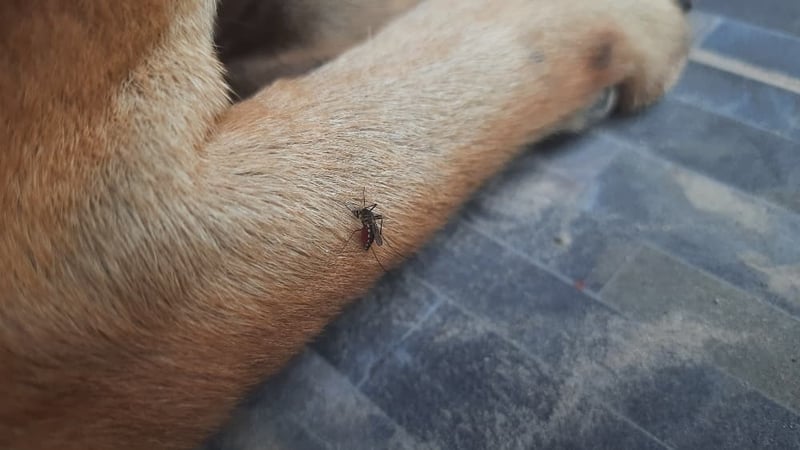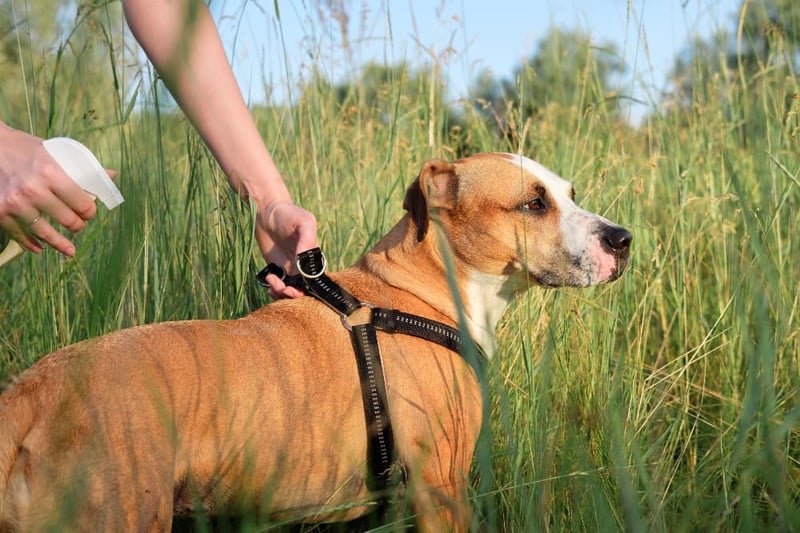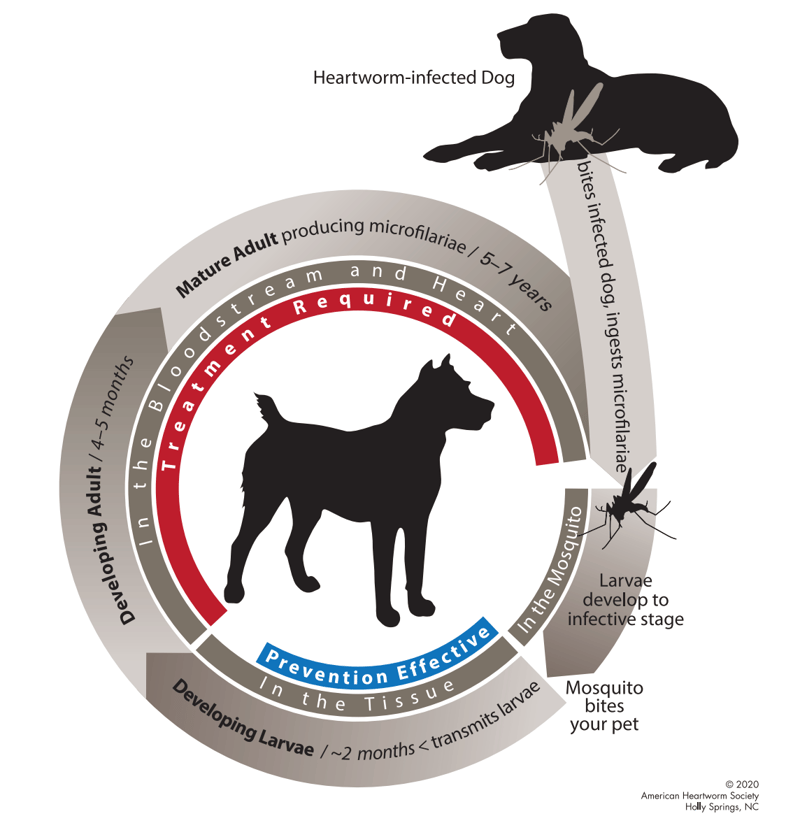
We all know the annoyance and frustration that mosquitoes cause, so you can imagine how much of a pain it is for your dog. Find out how to prevent and treat mosquito bites on dogs so you both can get back to enjoying summer.
Mosquitos are an inevitable fact of summer, but mosquito bites on your dog don’t have to be. We often coat ourselves with chemicals like Deet that effectively repel mosquitoes, but those harsh chemicals can be very harmful to your dog.
Fortunately, there are natural ways to prevent mosquitoes from hanging around your dog and easy steps for treating mosquito bites on your dog, reducing the symptoms and soothing your dog’s uncomfortable itch.
Can Dogs Get Mosquito Bites?
This one is likely very obvious, but yes, mosquitoes love dogs almost as much as they love us. The more important question is whether mosquito bites cause a different reaction in dogs than in people.
All of us have had the misfortune of getting stung by mosquitoes, and we know the pain of the raised, itchy bumps they leave behind, but do dogs suffer the same repercussions?
Mosquito Bites on Dogs

The warmer seasons bring out many bugs, but none are as persistent and widespread as mosquitoes. Mosquitoes congregate in areas that provide moisture and protection from the elements, so grass and bushes will host large populations.
Though these pests love to snack on us, your dog is an easy target because he is much closer to the ground. His legs and undercarriage are only inches from the grass, if not less, making them the lowest-hanging fruit.
Later, we’ll talk about how you can prevent and treat mosquito bites on your dog, but first, let’s figure out what a mosquito bite does to your dog and how to spot them.
Why Do Mosquitos Bite?
Mosquitos require blood to reproduce, so they use their long stinger-like mouth to pierce the skin and suck out small amounts of blood. At the same time, they inject saliva that contains an anticoagulant to prevent the blood from clotting.
Female mosquitoes need nutrients, like protein and amino acids, from blood to help them develop eggs.
Without it, they would not be able to reproduce. Male mosquitoes do not bite because they don’t require blood. Instead, they survive on nectar and plant sap for nutrients.
What is a Mosquito Bite?
The body recognizes the saliva deposited from a mosquito bite as a foreign substance, triggering an immune response. This is what causes the swelling and itchiness.
The bite itself is usually more of an annoyance than a danger, but mosquitoes are also carriers of many diseases, parasites, and bacteria. That means mosquitoes have the potential to seriously harm your dog.
Where your pet gets bitten can also be a factor in how serious the immune response will be. For example, a bite to the leg or belly may just produce the same raised, itchy bump you are used to getting, but a bite to a more delicate area might be more painful, or the reaction of the bite could have worse consequences.
Your dog’s ears, face, and paws can be a particularly painful place for a bite, and swelling to these areas could affect mobility, sight, and breathing.
How to Spot a Mosquito Bite on Your Dog

When you are out on a walk, you’ll probably notice mosquitoes hanging around your dog. If they are not properly protected, they will likely get a bite or two, or maybe twelve.
When you get home, a thorough check of your dog’s body will help you spot bug bites so you can treat them before they become too annoying for your pet.
Check the areas with the easiest access to mosquitoes. Mosquito bites on a dog's legs are very common. Your dog will disturb the pests as they trek through the grass, and their legs and paws are the closest food source. Their underbelly, chest, and face are also areas that are a common focus for mosquitoes.
It can be hard to find a little bug bite on your big furry pal, so the next way to identify a bite is to monitor your dog’s behaviour and look for signs of mosquito bites.
Just like us, your dog will react in some predictable ways to a mosquito bite. Here are a few things you might notice to indicate that your dog has been bitten:
-
- Scratching, biting, or licking
- Minor swelling of the area
- Redness or hives
- Hot Spots
- Restlessness
It’s not uncommon to mistake minor mosquito bite symptoms for regular seasonal itch, so look for behaviours outside your dog’s norm. For example, excessive scratching or licking, over-grooming, or general discomfort should always be looked into.
The more mosquito bites your dog gets, the worse the reaction can be, and mosquitoes rarely dine alone. This is why safe and appropriate mosquito protection is important for dogs and people who love the outdoors.
Can Dogs Be Allergic to Mosquito Bites?
Though most mosquito bites on dogs are mild and mostly just annoying, sometimes a more severe reaction can be seen. An allergic reaction to a mosquito bite could be more than an inconvenience. It could be painful or potentially life-threatening.
Mosquito allergies in dogs are rare, but some dogs do experience more severe reactions to the bites. These reactions can range from widespread hives, extreme swelling of the area, or an anaphylactic reaction.
Anaphylaxis is unlikely, but swelling and hives can be extremely painful. Depending on where the bite is, swelling can become dangerous. Swelling of the face and neck can affect your dog’s breathing.
If you suspect an allergic reaction from a bug bite, it’s best to contact your vet for further instructions. They can tell you if it’s something that can be treated at home or advise you to bring your dog in for medical treatment.
Heartworm in Dogs
Though most mosquito bites only create mild and annoying reactions, mosquitoes can do much more harm. Because these pests aren’t particular about whom they feast on, they can easily pick up and transfer diseases, bacteria, and parasites.
Many very scary diseases are primarily spread by mosquitoes, like malaria, West Nile, and Zika virus, but in North America, the most likely complication for your dog is heartworm.
What is Heartworm?
Heartworm is a blood-borne parasite called Dirofilaria immitis. It is easily passed from animal to animal through mosquito bites. Heartworm is very serious and life-threatening if it’s not caught early and treated correctly.
Understanding how heartworm spreads, the signs of heartworm in dogs, and the appropriate treatments can help you protect or save your dog’s life.
Heartworm Life Cycle
This parasite spreads when a mosquito takes blood from an infected animal. Their blood will contain microfilaria, which is the earliest stage of the heartworm life cycle. Once the mosquitoes have ingested the microfilaria, they develop into larvae inside the mosquito’s gut for 1-2 weeks.
Once the larvae develop into the infective stage, they work their way from the mosquito’s gut to their mouth, allowing them to be implanted into a new host when the mosquitoes release their saliva.
Larvae continue to develop in your dog’s body for up to 2 months. The worms have entered the third phase of their life cycle, called developing adults.
They are now free to navigate your dog’s bloodstream, making their way to the heart and lungs. Here, they continue to develop into mature adults.
This process can take up to 6 months, but once full-grown, the mature heartworms can start producing microfilaria, where mosquitoes can ingest their infected blood and pass on the worms to the next unsuspecting victim.
How Do Heartworms Affect Your Dog?
Mature heartworms can live for over 5 years, and during this time, they can do significant damage to your dog’s heart, lungs, and overall health. As the worms grow, they spread throughout the heart, clogging arteries and other important veins.
This restricts blood flow in and out of the heart and limits oxygen distribution throughout the body. Heartworm is fatal if it’s not caught early enough. The speed and amount of damage will depend on the size and positioning of the worms.
Adult females can get up to 14” in length, males about half that, meaning they can quickly infiltrate the blood vessels of the heart and lungs.
Do yourself a favour, and don’t look up an image of heartworms! It’s nightmare fuel.
The hardest part about treating heartworm is that signs of the parasites are usually not seen until the problem is very advanced and potentially difficult or impossible to treat. This is because the worms take so long to fully mature and spread.
Symptoms of Heartworm in Dogs

Identifying signs of heartworm in your dog is extremely important for the appropriate treatment of the parasite. If you see any of the following signs, contact your vet immediately:
-
- A dry cough
- Shortness of Breath
- Lethargy or weakness
- Collapse
These symptoms often follow physical exertion but will worsen as more damage is done by the worms. The earlier you see the signs and act, the better your chances of treating the infestation. As the infection progresses, treatment will get more and more difficult.
Heartworm infections are classified into four stages of severity, class 1 through 4. Stage one often shows no symptoms, while stages 2 and 3 show varying degrees of the common symptoms mentioned above.
Class 3 infections will also present with whole-body deterioration, like a dull coat, weight loss, muscle depletion, and a distended belly. This advanced stage means that the worms have significantly affected the heart’s function.
Though heartworm is potentially still treatable at this stage, your dog may suffer from lifelong health issues due to damage to the heart and lungs.
Classes for infections are no longer treatable, and at this stage, the goal is to provide palliative care. Dogs with class 4 heartworm infections suffer from caval syndrome. With caval syndrome, the damage to the organs is too great, and the dog will likely be in multi-organ failure.
How is Heartworm Treated?
When caught early enough, two medications (Melarsomine and Ivermectin) are administered to kill the adult worms and the microfilaria. Though the medications are effective, there are potential side effects of using any medications with neurotoxic effects.
Doses are low enough that they are typically safe to use. Still, the risk of side effects is greater in extremely immunocompromised dogs because of the damage from heartworms or other illnesses.
Another treatment option in more advanced cases is to surgically remove adult worms from the heart, but this treatment is very risky. Usually, it doesn’t have a high survival rate for dogs already suffering from caval syndrome.
Your vet will be able to instruct on the safest and most effective course of treatment, depending on your dog’s stage of infection.
Preventing Heartworm Infections in Dogs
Heartworm medications from your vet, like Revolution, are recommended in areas with high mosquito activity. Coastal areas and areas surrounding the Great Lakes have some of the highest mosquito populations each season, so heartworm prevention is necessary.
Land-locked provinces, like the prairies, have fewer mosquitoes, but that doesn’t mean the risk is gone. While heartworm medications are commonly used in these places, proper pest prevention is still highly recommended to further reduce your dog’s risk of infection.
Talk to your vet about the most effective preventative measures in your area.
How Do You Treat Mosquito Bites on Dogs?
Ok, enough about worms; let’s get back to those annoying pests, mosquitoes.
Mosquito bites are usually just a mild annoyance, but proper treatment of the bite can reduce irritation and discomfort and possibly prevent infections caused by your dog’s scratching and licking.
Standard wound and infection treatments are suitable for normal bug bite reactions. Over-the-counter treatments, like Neosporin, are safe to use on dogs and can quickly disinfect the area to prevent infection and speed healing.
How Long Does it Take for a Mosquito Bite to Go Away on a Dog?
Mosquito bites on dogs are annoying and uncomfortable, but they typically heal on their own if they are not fussed with too much. The itch and tenderness at the bite site should go away after a few days, and the mark will heal over a week or so.
This timeline is, of course, under ideal circumstances. The more your dog scratches and licks the bites, the worse they will get, and the longer the discomfort will persist.
Singular bites on your dog will often be minimally annoying and will heal quickly, but the more mosquito bites your dog has, the more difficult the healing process will be. Soothing the itch and discomfort with a topical treatment will speed up healing.
Natural Ways to Soothe Mosquito Bites on Dogs
Many natural wound and infection treatments are available for pets. These carry less risk than human wound treatments and are typically equally effective. These homeopathic and natural solutions use the natural healing properties of herbs, botanicals, and minerals to prevent infection.
Here are some of our top picks:
Additionally, coconut oil can be topically applied to soothe the itch and speed healing. Coconut oil has natural antibacterial and anti-inflammatory properties that can support healing and reduce swelling and irritation.
How to Prevent Mosquito Bites on Dogs

You now know what to expect from a mosquito bite and the potential dangers that mosquitoes present, so you know that the best way to protect your dog is to prevent mosquito bites in the first place. While our bug-repellant sprays are not safe for dogs and are only arguably safe for us, there are methods of repelling mosquitoes and other pests from your pooch.
Proper treatment of bug bites is relatively simple as long as you are consistent. Monthly preventative treatments are often preferred because they can be applied once and provide up to a month’s worth of protection.
Our top pick is Elanco Advantix II. It’s marketed for fleas and ticks, but is also an effective repellent for mosquitoes and lice. A tube of this mosquito medicine for dogs is applied to the base of your dog’s back and neck once per month.
How to Keep Mosquitoes Off Dogs
If you are looking for extra protection or prefer to stick to more natural repellents, you can use a dog-safe bug spray each time you go out. There aren’t too many options in Canada, as bug sprays must pass the same strict and expensive tests as chemical insecticides.
This cost-prohibitive process means that only a handful of effective pest control treatments exist in Canada.
Our favourite bug spray for dogs (and horses) is called Citrobug. Citrobug is made from safe essential oils that naturally repel insects. A light layer can be sprayed on your dog’s body, legs, and chest to make them an uninviting environment for these pests.
Avoid spraying on your dog’s face. Instead, spray a cloth and carefully wipe your dog’s face, avoiding the eyes and mouth.
Many coat conditioning sprays utilize ingredients with natural pest repellent properties, like essential oils. We’ve heard from some customers that they help to reduce pest activity on their pets and leave their dogs’ coats soft and shiny.
DIY bug sprays can be made from essential oils, but they may not be as effective as store-bought ones. Always ensure that any essential oils you use are safe for use on dogs and mixed with an appropriate carrier oil like MCT coconut oil.
Plan Ahead to Avoid Mosquitos on Dogs
As mosquito season approaches, it’s up to you to plan your dog’s activities to keep him or her safe. For example, if you enjoy hiking or camping with your dog, you need to take the appropriate steps to protect your pet.
This could include bug spray, bug-repelling clothing, wound and infection treatment, and appropriate methods of shelter from bugs.
Your daily walks can be scheduled around the times of day with the lowest pest activity to limit exposure, and even your yard can be safeguarded with bug nets or dog-safe plants that deter mosquitoes.
To us, mosquitoes don’t pose a huge threat in Canada; they are more of an unfortunate annoyance, but the threat is very real for dogs. Your favourite summer activities with your pet don’t have to suffer, but you do need to take the threat that mosquitoes pose seriously to keep your pet safe.
Mosquitoes on Dogs FAQs
Can dogs get mosquito bites?
Yes, dogs can get mosquito bites just like humans, and these bites can be itchy and uncomfortable for them.
How can I tell if my dog has been bitten by mosquitoes?
Look for signs of mosquito bites on your dog, such as red, swollen, or itchy areas on their skin. Dogs may scratch or bite at the area if they're experiencing discomfort or itchiness.
Are mosquito bites dangerous for dogs?
Mosquito bites themselves are usually not dangerous for dogs, but they can lead to itching, discomfort, and potential skin infections if your dog scratches excessively.
What can I do to relieve my dog's mosquito bites?
You can relieve your dog's mosquito bites by applying a dog-safe anti-itch cream or gel recommended by your veterinarian.
How can I protect my dog from mosquito bites?
Protect your dog from mosquito bites by keeping them indoors during peak mosquito activity times, using dog-safe mosquito repellents or sprays, and making sure your outdoor area is free from stagnant water where mosquitoes like to breed.
When should I consult a veterinarian for mosquito bites on my dog?
If your dog's mosquito bites become severely swollen or infected, or if your dog shows signs of an allergic reaction like hives, difficulty breathing, or extreme discomfort, schedule an appointment with your veterinarian
.png?width=200&height=66&name=logo%20(1).png)





.jpg)
